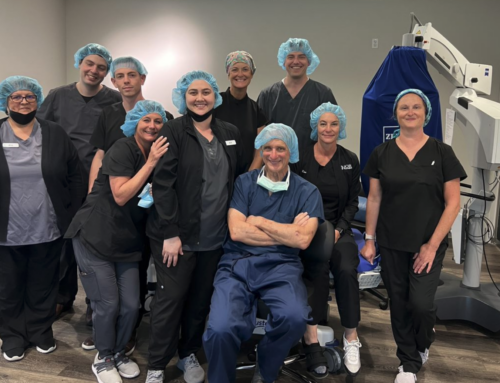It is common to wonder how eye surgery or an eye condition will impact your fitness routine. While it’s important to stay active, some exercise may do more harm than good.
Cataracts and exercise
Is it safe to exercise with cataracts?
Exercise will not make a cataract (cloudy natural lens inside your eye) worse. But a cataract that limits your vision can make it hard to exercise or play sports safely. If your cataract does not affect your vision, you can continue your normal physical activities.
Resuming a fitness routine after cataract surgery
Cataract surgery removes the cloudy lens that limits your vision. After the surgery, there are a few activity restrictions that help ensure a trouble-free recovery, including:
- No swimming. Water can cause infection or irritate the eye. Depending on your surgery, swimming (in any type of water) may be restricted for up to 4 weeks to protect the eye.
- No strenuous exercise. Large spikes in your heart rate can raise eye pressure, which can disturb healing of the eye.
- Avoid lifting weights or other heavy objects
- Don’t put your head below your waist, such as with yoga positions
Light aerobics like walking may be permitted soon after surgery. Be sure to wear wraparound sunglasses as your eye will be especially sensitive to light. Sunglasses also prevent dust and other irritants from entering the eye.
Your surgeon can tell you when you can resume more vigorous exercise.
Exercise restrictions after a posterior capsulotomy
It is common to need this laser procedure to clear vision after cataract surgery. Typically, there are no activity restrictions after a posterior capsulotomy, but ask your surgeon to be safe.
Eye injuries and exercise
Talk with your ophthalmologist before resuming any exercise after an eye injury. With injuries like corneal laceration, corneal ulcer or globe rupture, the eye is more vulnerable to further injury and infection. While you’re recovering:
- Avoid any exercise—especially contact sports—to let the eye heal.
- Swimming is not safe. With an opening in the cornea, a dangerous microbe called Acanthamoeba can enter your eye.
Glaucoma and exercise
Exercise restrictions for people with glaucoma
Regular, moderate-level exercise is healthy and safe with glaucoma. But extreme exercise—pushing and straining your body too much—can raise pressure inside the eye (this pressure is known as IOP, or intraocular pressure). High IOP can lead to optic nerve damage and vision loss.
For those who practice yoga, the Glaucoma Research Foundation recommends avoiding prolonged head-down poses such as:
- Downward-facing dog
- Standing forward bend
If you’re a fan of weightlifting and core (abdominal) exercises, watch your breathing:
- Holding your breath can raise eye pressure and cause other health problems.
- Never hold your breath while lifting weights unless instructed by a qualified trainer.
Returning to physical activity after glaucoma surgery
Restrictions vary by the type of glaucoma procedure:
- Laser surgery: Typically, there are no restrictions but confirm with your surgeon.
- Trabeculectomy and glaucoma drainage device (tube implant surgery): No swimming or getting water directly in your eyes. Avoid any lifting, bending or straining until cleared by your doctor. Light exercise like walking or treadmill may be permitted.
LASIK surgery and exercise
Safe activity guidelines after refractive surgery include:
- No swimming and exposing your eye to water for a minimum of 2 weeks until your eye heals.
- No strenuous exercise and contact sports for up to 1 month.
- When you are outdoors wear sunglasses—even on cloudy days—to protect your healing eyes from UV rays and debris.
Retinal conditions and exercise
Can I play sports with a retinal condition?
The retina is the light-sensitive tissue that lines the back of the eye. For those with retinal conditions like lattice degeneration, high myopia or posterior vitreous detachment, there is a higher risk of retinal detachment. Sports that include blows to the head and potential for whiplash injury or eye trauma raise the risk even higher.
While most exercise is safe, when the strength of the retina is uncertain, it is safest to avoid:
- Boxing, kickboxing and other combat sports
- Bungee jumping
- Bumper car rides
- Skydiving
If you are cleared to play sports like basketball or racquetball, wear protective eyewear to prevent eye injury.
In general, exercise is encouraged in those with diseases of the retina. It benefits your overall health and may even improve your eye health. With age-related macular degeneration and diabetic retinopathy associated with high blood pressure and high cholesterol—lowering these important health indicators with regular exercise may also limit the progression of eye disease.
If you see new floaters, flashes of light or other changes in vision, see your ophthalmologist as soon as possible.
Resuming physical activity after retinal surgery
Retinal specialists follow general guidelines for a safe return to exercise. But these guidelines will not apply to every person. Ask your surgeon when you can get back to your normal routine.
- No strenuous (tough or challenging) exercise for 1 to 2 weeks after most retinal surgery. Light exercise, like walking, may be safe. Ask your doctor.
- No swimming (or direct exposure of water to the eyes) for 1 to 2 weeks after most retinal surgery. Swimming is also restricted immediately after eye injections, such as Avastin or Eylea for AMD.
- No flying, high altitudes (mountains) and scuba diving after retinal surgery with a gas bubble. These and all other physical activities are restricted until the gas bubble goes away. Your doctor will give you guidance about when this might happen.
 Our practice philosophy at Barth Vision & Optical is simple, though we like to think it reflects a profound sentiment. We are here to be of service, in the truest sense of the term. We offer State-of-the-art eye examinations, A unique collection of fashion eye wear, Cataract surgery & consultation, LASIK vision correction, Eye Care Telemedicine. Call Today for an Appointment (707) 955-1120.
Our practice philosophy at Barth Vision & Optical is simple, though we like to think it reflects a profound sentiment. We are here to be of service, in the truest sense of the term. We offer State-of-the-art eye examinations, A unique collection of fashion eye wear, Cataract surgery & consultation, LASIK vision correction, Eye Care Telemedicine. Call Today for an Appointment (707) 955-1120.


